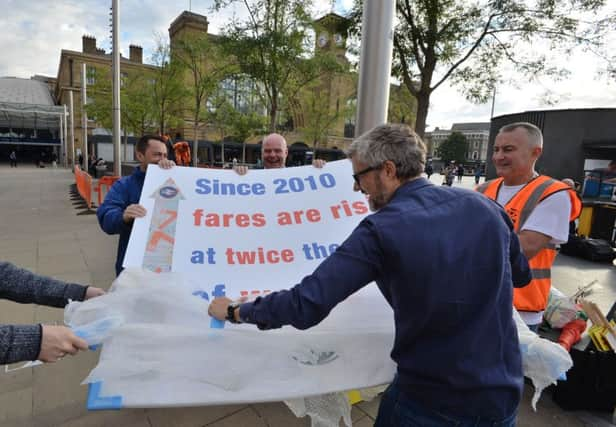Biggest rail fares hike for six years: How it will affect season tickets in Yorkshire


The hike of 3.6 per cent will add £42 to the cost of an annual season ticket from Ilkley to Leeds, taking the total to £1,218, and £57 to a similar ticket from Harrogate.
Advertisement
Hide AdAdvertisement
Hide AdA monthly season ticket from Driffield to York will rise by £13 to £394, and a six-monthly ticket from Hathersage to Sheffield will go up by £20 to £591.
The increases apply to “regulated” fares across England, including season tickets and many off-peak and standard returns.
They are measured each year by the Retail Prices Index figure for July, which was revealed today.
However, the more widely used measure, the Consumer Prices Index, was unchanged at only 2.6 per cent.
Advertisement
Hide AdAdvertisement
Hide AdThe anomaly prompted calls for the government to use the other measure instead.
David Sidebottom, director of Transport Focus, the independent transport user watchdog, said: “Yet again, passengers, now majority funders of the railway, face fare rises next January.
“Commuters do not give value for money on their railways a high satisfaction score - just one third according to our latest survey.
“So while performance remains patchy and with pay and wages not keeping pace with inflation, they will feel rightly aggrieved if they are paying much higher rises next January.
Advertisement
Hide AdAdvertisement
Hide Ad“Why is the Government not using its preferred measure of inflation: the one that is used to determine wages and pension increases, and one which is often lower than the Retail Prices Index? Why not use the Consumer Prices Index for rail fares too? Passengers deserve a fairer deal.”
His call was echoed by Stephen Joseph, chief executive of the Campaign for Better Transport, who called on the government to impose a fares freeze for January.
He said: “It has frozen fuel duty for the last seven years and we think rail fares should be given the same treatment.
“It’s unacceptable that the Government continues to use RPI to calculate rail fare rises. Passengers would be forgiven for thinking they are being taken for a ride when RPI has been dropped as an official measure for most other things.”
Advertisement
Hide AdAdvertisement
Hide AdAlex Hayman, Which? managing director of public markets, added: “This price hike will be a kick in the teeth for the majority of passengers who already feel they aren’t getting value for money for their train services.
“Commuters are forking out more and more money for their tickets but are still struggling with delays, overcrowding and dirty carriages on a daily basis.
“The Government has promised to put passengers first. So it must make sure that the new rail ombudsman delivers a step change in how passenger complaints are tackled.”
But Paul Plummer, chief executive of the Rail Delivery Group, which represents train companies and Network Rail, insisted that costs to the industry rose in line with the Retail Prices Index.
Advertisement
Hide AdAdvertisement
Hide AdHe said: “Rail companies are working together to improve performance now, adding thousands more seats over the next 18 months and, longer term, simplifying fares and ticket buying so that the country has the railway it needs to prosper.”
In London today, commuters were hit with three separate disruptions to travel networks as the fares hike was announced.
Travellers were told to avoid Waterloo station all day because of a points failure and a passenger train derailing after hitting a Network Rail engineering wagon at around 5:40 am.
Shortly after, a train at King’s Cross Station hit buffers before a fume-filled Holborn underground station was briefly evacuated.
Advertisement
Hide AdAdvertisement
Hide AdThe Rail, Maritime and Transport Union, whose members have staged a series of strikes on Northern Rail this year in a dispute over the roles of train guards, called for a return top public ownership.
Its leader, Mick Cash, said passengers “already fork out colossal sums to travel on rammed out, unreliable trains while the private operators are laughing all the way to the bank”.
It estimated that the 3.6 per cent hike would mean an extra £337m in revenue for the train operating companies.
Read more: